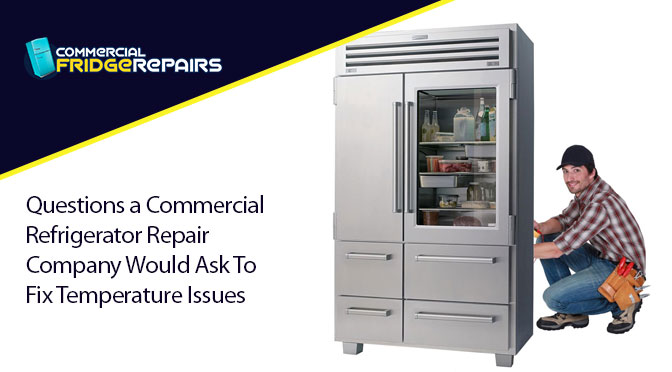Making Best Use Of Effectiveness: Commercial Refrigeration Fixing Techniques for Cost-Effective Solutions

Assessing Refrigeration System Efficiency
To efficiently examine the efficiency of a commercial refrigeration system, it is essential to perform complete assessments of its crucial elements and functional parameters. The initial step in examining system performance is checking out the performance of the compressor. The compressor plays an essential duty in preserving the desired temperature within the refrigeration device. Issues with the compressor can bring about insufficient cooling, temperature variations, and increased power intake. Performing routine examinations and efficiency tests on the compressor can assist recognize potential problems at an early stage and protect against costly break downs.
Additionally, reviewing the condenser and evaporator coils is paramount. Blocked or unclean coils can substantially influence the system's efficiency by hindering warm transfer processes. Cleansing the coils frequently and making sure proper air flow around them can maximize the system's cooling ability and lower energy usage. Monitoring cooling agent levels and stress is also vital in assessing system performance. Low cooling agent degrees or abnormal stress can show leaks or malfunctioning parts that require prompt interest to stop system failures and expensive repairs. By methodically reviewing these key components and operational criteria, companies can guarantee their industrial refrigeration systems operate at peak performance degrees, decreasing downtime and making best use of power performance.

Carrying Out Preventative Maintenance Procedures
Assessing the performance of a commercial refrigeration system gives valuable insights that can inform the application of preventative upkeep procedures critical for maintaining optimal performance and long life. Preventative maintenance is a positive approach aimed at recognizing and addressing possible problems prior to they intensify into costly issues that disrupt procedures. By developing a normal upkeep routine, refrigeration systems can operate successfully, lowering power usage and minimizing the threat of unanticipated malfunctions. Key preventative maintenance procedures consist of evaluating and cleansing condenser coils, inspecting cooling agent degrees, making certain appropriate air flow, and calibrating temperature controls. Furthermore, checking temperature level and moisture degrees, inspecting door seals, and resolving any type of unusual noises or smells promptly are necessary action in preventative upkeep. Executing these steps not only prolongs the life expectancy of the devices yet additionally boosts food safety and security by preserving consistent storage temperatures. Ultimately, buying preventative maintenance actions is an affordable approach that helps companies avoid expensive repair work and downtime, making certain reputable and continual refrigeration system performance.
Identifying Common Refrigeration Issues
One of the key aspects in preserving business refrigeration systems is immediately determining common issues that may arise throughout their operation. In addition, faulty gaskets on doors, resulting in air leakages, can trigger the refrigeration system to function harder to keep the desired temperature. By without delay identifying and resolving these common refrigeration concerns, businesses can ensure the effective procedure of their systems and lessen pricey repair try these out services.
Utilizing Energy-Efficient Repair Service Strategies
When considering industrial refrigeration repair work, carrying out energy-efficient techniques is critical to enhancing the system's efficiency and lowering functional prices. Among the essential approaches in attaining energy performance is making sure that the refrigeration system is correctly kept. Regular upkeep, such as cleaning up condenser coils, looking for cooling agent leakages, and adjusting temperature setups, can substantially improve energy performance.
One more energy-efficient repair strategy is upgrading to high-efficiency components - commercial refrigeration repair. By replacing older, find more information less reliable parts with energy-efficient options, such as ECM follower electric motors or LED lighting, companies can reduce power intake and lower energy costs. Furthermore, setting up programmable thermostats and power administration systems can help control temperature levels better, protecting against unneeded power use
Furthermore, maximizing the system's insulation and securing any leakages can additionally contribute to power cost savings. Proper insulation helps preserve regular temperatures within the refrigeration device, lowering the workload on the system and boosting total efficiency. By integrating these energy-efficient repair service techniques, organizations can not only lower their ecological influence yet additionally attain long-lasting cost savings.
Optimizing Refrigeration System Life Expectancy
To guarantee the durability and optimum efficiency of industrial refrigeration systems, keeping energy-efficient fixing practices is necessary, with an emphasis now moving in the direction of optimizing the refrigeration system life expectancy. Optimizing the life expectancy of a refrigeration system involves aggressive maintenance, timely fixings, and adherence to producer standards. Normal evaluations to detect prospective concerns before they escalate can dramatically extend the system's life-span (commercial refrigeration repair). Executing a preventive maintenance schedule that includes jobs such as cleaning coils, examining refrigerant degrees, and checking insulation can aid identify issues early and stop expensive malfunctions.
Additionally, investing in top quality components and parts during repairs and substitutes can boost the toughness of the refrigeration system. By focusing on aggressive maintenance and making use of top quality parts, businesses can enhance the lifespan of their business refrigeration systems, eventually lowering downtime and operational costs.
Conclusion
Finally, by regularly assessing refrigeration system performance, implementing preventative upkeep procedures, determining common refrigeration issues, making use of energy-efficient repair techniques, and optimizing the system's lifespan, companies can make the most of effectiveness and minimize prices connected with business refrigeration repair. These affordable options assist to make certain that refrigeration systems operate at peak efficiency, ultimately causing raised productivity and profitability for services over time.

When considering industrial refrigeration repair Full Article service, applying energy-efficient strategies is extremely important to optimizing the system's performance and minimizing functional costs.To make sure the durability and optimal efficiency of business refrigeration systems, keeping energy-efficient repair practices is vital, with an emphasis currently changing in the direction of maximizing the refrigeration system life expectancy. Maximizing the life-span of a refrigeration system entails aggressive upkeep, prompt repairs, and adherence to maker standards.